Luxury Cars at "Cabbage Prices" for Three Days? A Rush Before Tax Adjustment
![]() 07/21 2025
07/21 2025
![]() 533
533
Hesitation often leads to defeat.
Who would have predicted that Porsche, amidst layoffs and store closures, would suddenly surge in popularity?
Last week, Porsche dealerships were jam-packed as customers scrambled to make purchases, with visitor numbers far exceeding the norm. Even display cars were sold during this flurry of activity.
Besides Porsche, 4S stores of Mercedes-Benz, BMW, Audi, and Land Rover Jaguar also witnessed a surge in car viewings and purchases, as if wealthy individuals were also participating in the 618 shopping event.
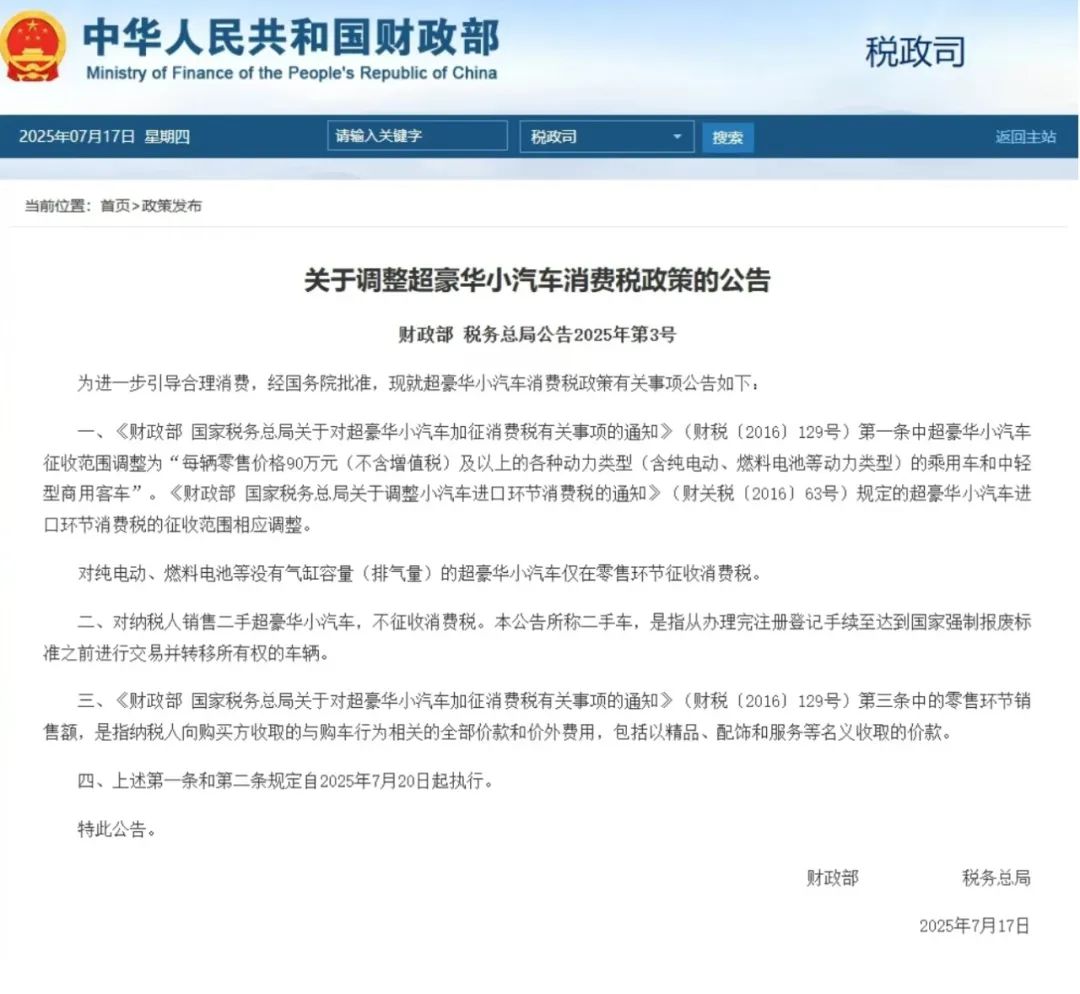
This phenomenon can be attributed to an announcement issued by the Ministry of Finance and the State Taxation Administration on July 17. The "Announcement on Adjusting the Consumption Tax Policy for Super Luxury Cars" revised the taxation threshold for super luxury cars to 900,000 yuan and above, while simultaneously eliminating the tax exemption for new energy vehicles.
It's remarkable that even the wealthy, who can afford million-yuan luxury cars, have started to save tens of thousands of yuan.
In response to the sudden surge in market demand, automakers and dealerships promptly launched promotional activities. Terminal dealerships swiftly created posters to inform potential car owners about the luxury car tax adjustment, hoping to convert as many inquiries into actual sales before July 20.
"Three-Day Shopping Frenzy"
In the three days before the policy's implementation, the luxury car market experienced a frenzy reminiscent of "Black Friday". Million-yuan luxury cars were sold like hotcakes, and customers' inquiries shifted from various comparisons to the most practical question: "Can I get the invoice before the 20th?"
According to the new tax regulations, the luxury car tax threshold was lowered from the previous 1.3 million yuan to 900,000 yuan, with the excess above 900,000 yuan taxed at 10%. Simply put, a car priced at 1.5 million yuan will require an additional tax payment of 130,000 yuan after the new policy takes effect.
The models facing taxation within the price range of 900,000 to 1.3 million yuan are precisely the main sales and profitable models of first-tier luxury brands, including popular models such as the Porsche Cayenne, BMW 7 Series, Mercedes-Benz Maybach S-Class, and Land Rover Range Rover.
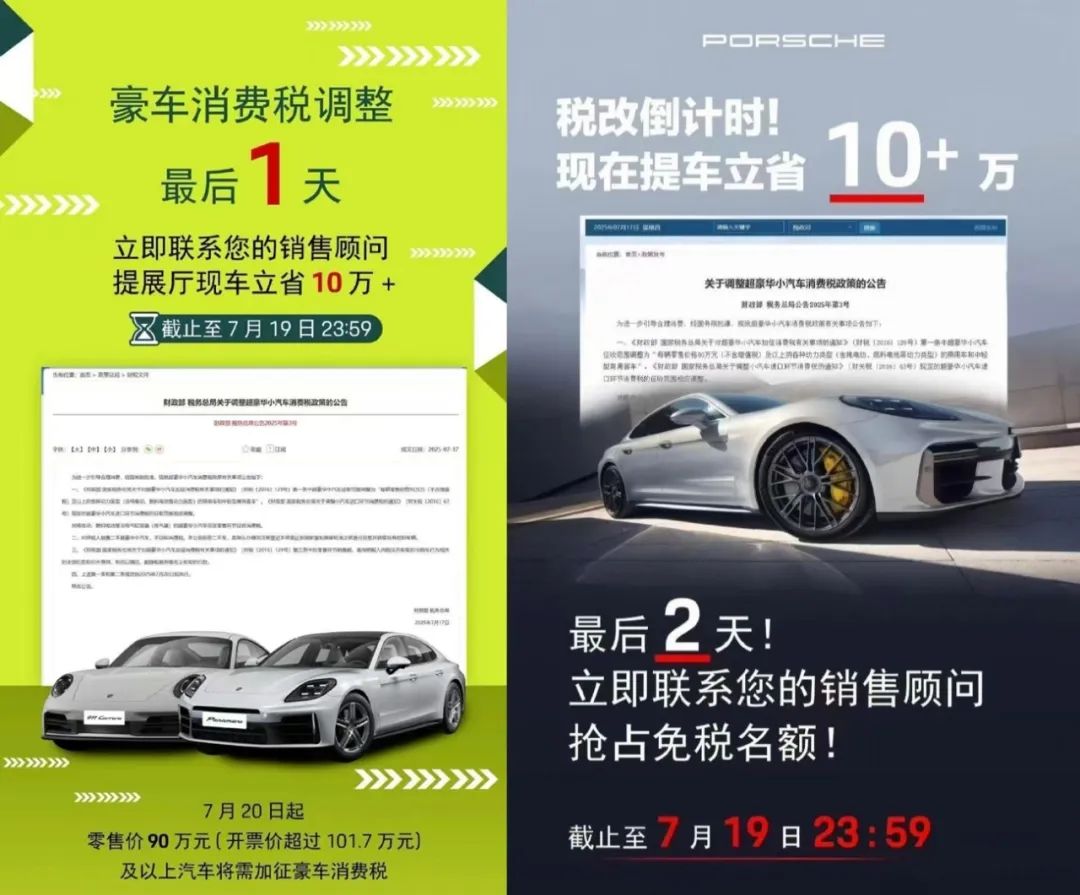
Some Porsche dealerships quickly released posters prominently displaying the message "Order now and save 100,000 yuan," even customizing multiple posters with countdown days to create a sense of urgency.
In the two days before the policy's implementation, it did boost sales in the first tier. According to a blogger who deals in parallel imports, the three-day buffer period almost exhausted sales for the next three to four months, clearing a significant amount of inventory. To save on taxes, some salespeople even purchased three million-yuan luxury cars on the last day.
4S stores were exceptionally bustling. A salesperson at a Porsche dealership said, "The store has been incredibly busy these two days, with a surge in sales reception, inquiries, and car orders." Faced with the sudden increase in sales, even experienced salespeople have remarked that million-yuan luxury cars are being snapped up like cabbages, and even display cars are being eyed.
The most intuitive indicator is sales volume. A salesperson at a Porsche dealership stated that four cars were sold on July 18 alone, exceeding the monthly sales volume on average, making overtime work more motivating.
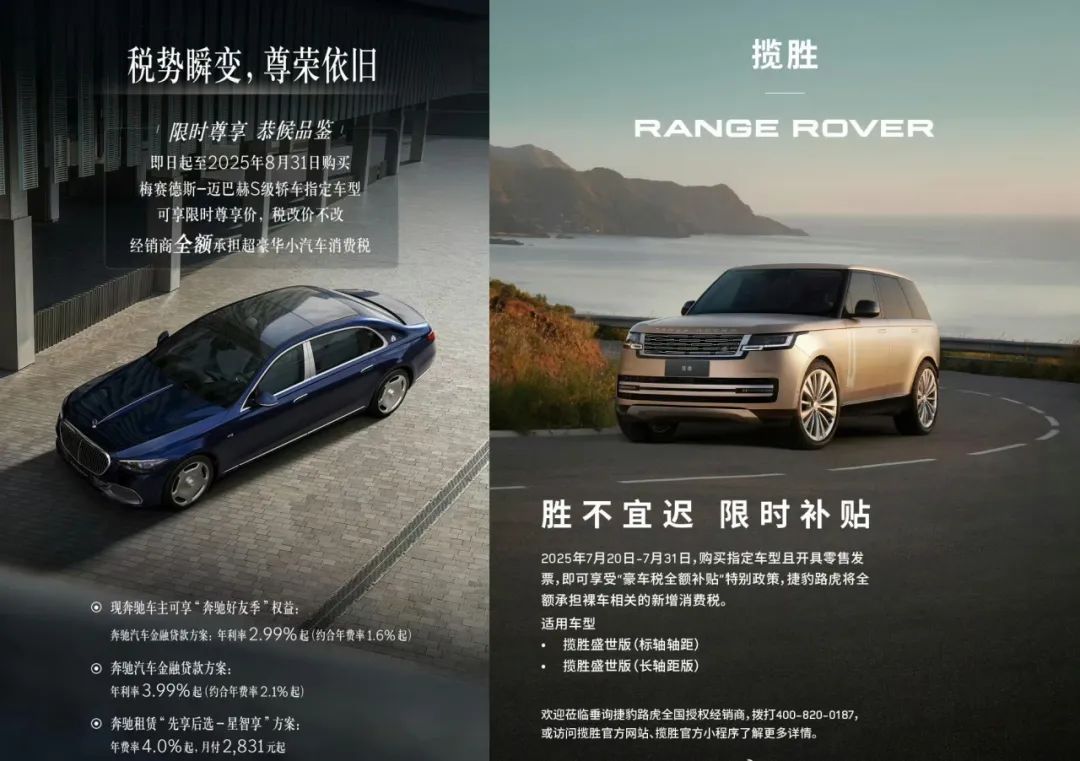
The three-day buffer period was still too short for terminal dealerships, especially since the models are all luxury cars priced above one million yuan. Dealerships cannot stockpile too many cars, and many also face the issue of insufficient tax invoice quotas.
At this point, automakers can only rely on quickly following up with the new policy. On the first day of the new policy's implementation, Jaguar Land Rover announced a new policy to provide full subsidy coverage for users purchasing specified models from July 20 to July 31. Jaguar Land Rover will fully bear the additional consumption tax.
Mercedes-Benz was even more generous. The poster released by Mercedes-Benz on the same day extended the full subsidy coverage for the consumption tax of specified models to August 31, with dealers fully bearing the cost.
It can be said that in the face of the sudden policy change and the long-term high-pressure situation in the automotive market, the response from grassroots dealers to upstream automakers has been swift, not missing any marketing window.
Luxury Car Market Faces Drastic Changes
While many are focusing on imported luxury brands, the new policy actually has a significant impact on the entire automotive market.
According to the new policy, luxury cars subject to the consumption tax are not limited to traditional fuel vehicles. New energy power types, including pure electric and fuel cell vehicles, are also included in the taxation scope. This is the first time in China that fuel vehicles and new energy vehicles are taxed equally.
It is reported that in addition to Jaguar Land Rover and Mercedes-Benz announcing full subsidy coverage for the additional consumption tax, Zenith S800 also provides full price coverage for car owners who placed orders before July 20 with a price exceeding 1.017 million yuan. Although there is no official poster, salespeople have communicated the new policy with many potential car owners.
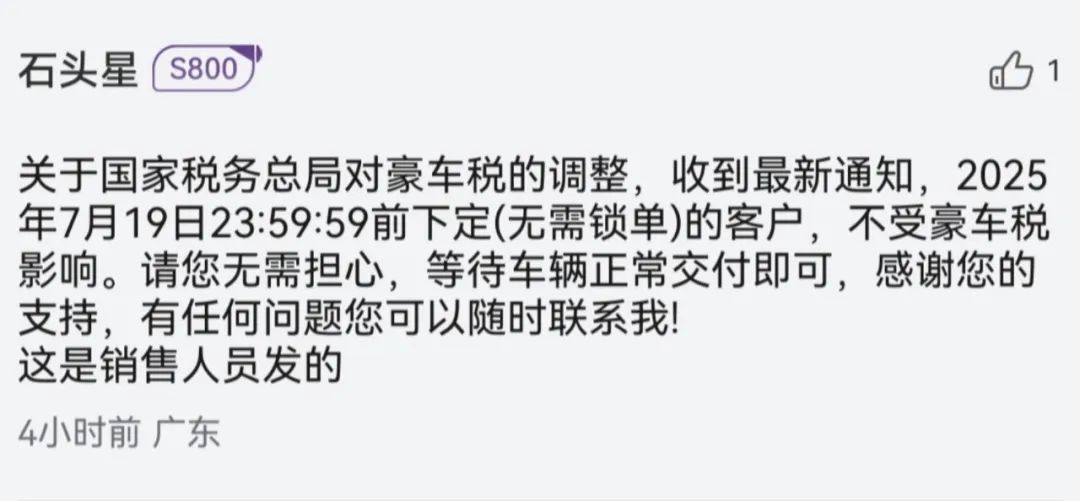
Behind this may be a policy pilot in the Chinese market after new energy vehicle sales accounted for nearly 50% of the total. Currently, the country is still in a policy support period for new energy vehicles, still providing preferential policies such as tax exemptions on vehicle purchases. At the same time, new energy vehicles can also enjoy more subsidies than fuel vehicles in trade-in subsidies.
In the face of changes in market policies, Tesla is always among the fastest to adjust among new energy automakers. Currently, Tesla has lowered the price of the entry-level Model X from 920,000 yuan to 899,000 yuan, precisely aligning with the new regulations, and simultaneously split the Full Self-Driving (FSD) into an optional package to avoid taxation.
It can be said that the new policy will certainly force the luxury car market to further adjust prices in the short term, lowering the prices of some models to within 900,000 yuan.
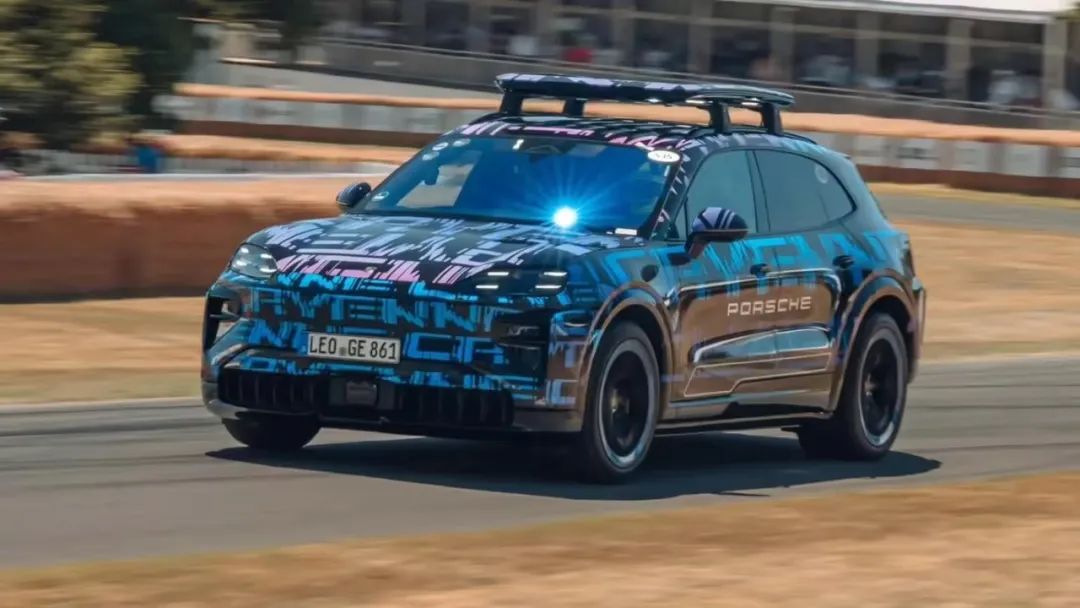
For example, although Porsche has not yet issued any official announcement for price adjustments, as the luxury car brand with the worst performance in the Chinese market this year, its sales volume declined by 28% in the first half alone, making it one of the brands most affected by the new policy. Popular models including the Cayenne (starting at 918,000 yuan), Taycan (starting at 918,000 yuan), and Panamera (starting at 1.138 million yuan) all face taxation.
On the other hand, the upcoming electric Cayenne will also struggle to obtain consumption tax exemptions, which can be described as adding insult to injury. This may affect Porsche's adjustment of the starting price for the electric Cayenne in the Chinese market.
What is more crucial is the impact of tax reform on the future of new energy vehicles. In terms of sales, the number of imported cars in China has already declined to a historical low, with only 700,000 imported in 2024. The impact of tax reform will not be too significant.
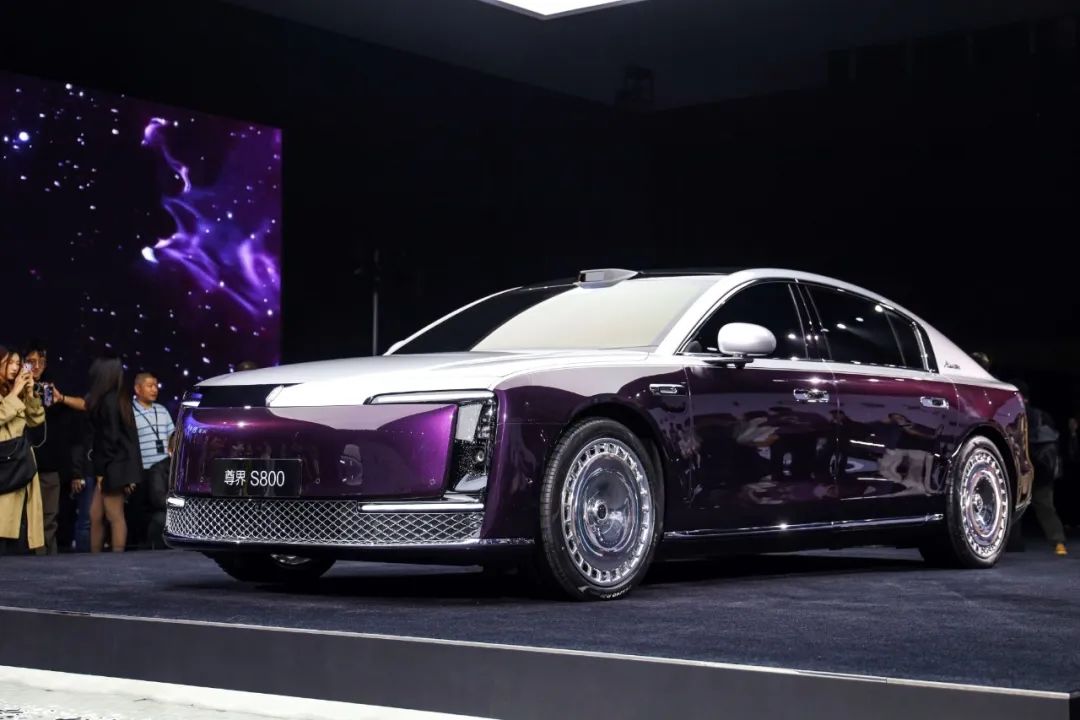
More importantly, it affects domestic independent brands. Synchronized with the development of new energy vehicles is the domestic luxury car market. For example, BYD has launched the high-end brand Zenith with a starting price of over one million yuan, NIO has released the executive sedan ET9 with a price close to 800,000 yuan, and the previously mentioned Zenith S800 also has a price above 800,000 yuan.
It can be said that after occupying the mainstream market, independent brands have also begun to move towards the high-endization of new energy. Multiple popular models are also within the new taxation scope. Moreover, the policy for tax exemptions on new energy vehicle purchases will also be adjusted in 2026. With multiple policies overlapping, the high-end new energy market may face more pressure.
In the short term, the new policy will undoubtedly lead to a decline in sales of luxury cars priced between 900,000 and 1.3 million yuan. Furthermore, it is rumored that relevant departments will also restrict the transfer of ownership of new cars to prevent some merchants from exploiting loopholes. Automakers can only choose between price and sales volume.
It can be foreseen that in the future, fuel vehicles and new energy vehicles will return to a situation of competition on the same stage. After losing policy preferences, new energy automakers need to enhance product competitiveness to compete with fuel vehicles in the market.
Note: Some images are sourced from the internet. If there is any infringement, please contact us for deletion.
-END-






